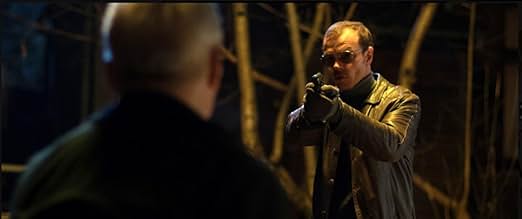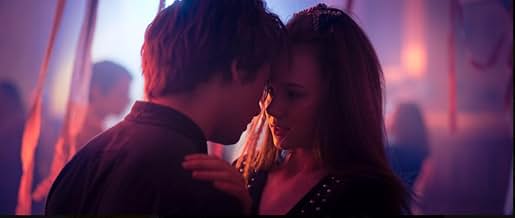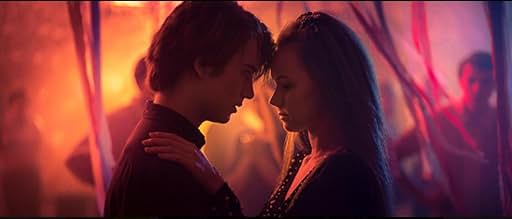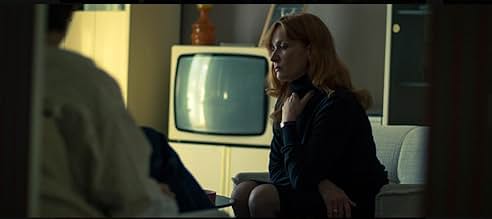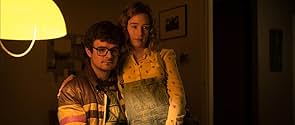In an early-'80s Polish town, a prostitute and a youth leader are found killed, but the police's handling of the case makes two journalists suspicious.In an early-'80s Polish town, a prostitute and a youth leader are found killed, but the police's handling of the case makes two journalists suspicious.In an early-'80s Polish town, a prostitute and a youth leader are found killed, but the police's handling of the case makes two journalists suspicious.
- Awards
- 1 win & 1 nomination total
Browse episodes
Featured reviews
Had me drawn in, once I started watching I couldn't stop. Well written, and nicely paced, There's nothing dumb or not believable. The acting is outstanding, I'd love to see another season.
The first season of this Polish series opens in the mid-1980s with the discovery of two bodies in the forest near a minor city. One is a local senior communist official, the other a prostitute. The militia quickly make an arrest and the suspect confesses however veteran reporter Witold Wanycz has his doubts. His investigation, with the help of young editor Piotr Zarzycki, uncovers truths than others wish to keep hidden... putting them on a collision course with some very dangerous characters.
Twelve years pass before the second season starts; this means there have been major changes in Poland; most obviously the communist regime has fallen and it is now a democratic country. As the series starts the body of a boy has been discovered following a flood caused by a breeched levee. The flood has also exposed a cemetery where victims of a massacre that took place shortly after the war; few people want the truth about that incident to be revealed. Senior police officers accept that it was just a tragic accident; newly transferred Sgt Anna Jass looks at the case more closely and starts to wonder about how convenient the flood was for a new upmarket housing development. The story is picked up by Piotr, who is now editor in chief. Intertwined with this investigation we see flashbacks of what happened in the aftermath of the war and Witold's connection to it.
I really enjoyed this series. The first season nicely captured the feel of life under an oppressive regime where towing the party line mattered more than the truth. The central mystery is intriguing and doesn't always go in ways one might expect. The second season, which I enjoyed just as much, shows how many things may have changed but attitudes take longer to moderate. There are plenty of genuinely tense moments with real danger for many characters. One might think the series would be pretty grim but there are enough lighter moments to mitigate this. The cast does a really fine job; most obviously Andrzej Seweryn, Dawid Ogrodnik and Magdalena Rózczka as Witold, Piotr and Anna respectively. Overall I'd certainly recommend this to fans of subtitled drama.
These comments are based on watching the series in Polish with English subtitles.
Twelve years pass before the second season starts; this means there have been major changes in Poland; most obviously the communist regime has fallen and it is now a democratic country. As the series starts the body of a boy has been discovered following a flood caused by a breeched levee. The flood has also exposed a cemetery where victims of a massacre that took place shortly after the war; few people want the truth about that incident to be revealed. Senior police officers accept that it was just a tragic accident; newly transferred Sgt Anna Jass looks at the case more closely and starts to wonder about how convenient the flood was for a new upmarket housing development. The story is picked up by Piotr, who is now editor in chief. Intertwined with this investigation we see flashbacks of what happened in the aftermath of the war and Witold's connection to it.
I really enjoyed this series. The first season nicely captured the feel of life under an oppressive regime where towing the party line mattered more than the truth. The central mystery is intriguing and doesn't always go in ways one might expect. The second season, which I enjoyed just as much, shows how many things may have changed but attitudes take longer to moderate. There are plenty of genuinely tense moments with real danger for many characters. One might think the series would be pretty grim but there are enough lighter moments to mitigate this. The cast does a really fine job; most obviously Andrzej Seweryn, Dawid Ogrodnik and Magdalena Rózczka as Witold, Piotr and Anna respectively. Overall I'd certainly recommend this to fans of subtitled drama.
These comments are based on watching the series in Polish with English subtitles.
1984 (a coincidental choice? I do not think 'tis so...).
A fictitious voivodeship city in late-communist Poland (with its degenerate monoparty's power being behind almost anything that goes on there).
This bleak city, with its foresty and marshy surroundings, is a character of its own - it pulls you in, and does not want to let you go. Ever. Darkness is dwelling here - covering some of the ugliness but also feeding on the past and being constantly reinforced by the present, overshadowing the future and hope. Killing innocence.
An old, weary journalist, together(?) with his new, enthusiastic and idealistic colleague attempt to shed some light on the darkness. Will they be able to fully pierce through it? And should they bring out to plain view everything they manage to uncover...?
This bleak city, with its foresty and marshy surroundings, is a character of its own - it pulls you in, and does not want to let you go. Ever. Darkness is dwelling here - covering some of the ugliness but also feeding on the past and being constantly reinforced by the present, overshadowing the future and hope. Killing innocence.
An old, weary journalist, together(?) with his new, enthusiastic and idealistic colleague attempt to shed some light on the darkness. Will they be able to fully pierce through it? And should they bring out to plain view everything they manage to uncover...?
I started watching it with low expectations and although the first episodes have some parts that seem unconnected or are hard to follow, the setting in an 80s communist Poland city and the good performance of the actors slowly help you to become more and more interested in the story.
It is excellently shot, and it helps you to see a bit of what life was like in Eastern Europe in the 80s.
Interesting, well made and only 5 episodes. Recommended!
My one piece of advice is that you don't leave gaps of more than one day between episodes, especially if your memory isn't brilliant or you're prone to lapses of concentration. You WILL get hopelessly lost (I did). With that qualification out of the way, I thought it was well conceived and executed with no unnecessary gloss, which would have undermined the gritty atmosphere that the series evoked.
- How many seasons does The Mire have?Powered by Alexa
Details
Contribute to this page
Suggest an edit or add missing content


![Trailer [OV]](https://m.media-amazon.com/images/M/MV5BYjRhMDU5NmUtYzNhNi00NmNmLWFkNTItM2U0ZWVhYzFkNDdkXkEyXkFqcGdeQUlNRGJWaWRlb1RodW1ibmFpbFNlcnZpY2U@._V1_QL75_UX500_CR0)
